Risque
Le rapport « La situation mondiale des transferts monétaires » du CaLP Network indique que l’idée selon laquelle les transferts monétaires seraient plus risqués que d’autres formes d’aide est l’une des barrières principales à l’utilisation fréquente de cette modalité. Ces craintes sont liées à l’insistance de plus en plus franche des bailleurs concernant la lutte contre le terrorisme et contre le blanchiment d’argent, et à l’amenuisement des budgets destinés à l’assistance humanitaire. Le travail du CALP Network sur cette problématique vise à combattre les idées reçues, à faciliter la collaboration et à partager les apprentissages afin de veiller à ce que les transferts monétaires soient systématiquement considérés, tout comme d’autres modalités, en fonction des données probantes disponibles sur les risques réels de toutes les modalités.
Priorités actuelles
Plusieurs organisations travaillent actuellement sur les risques entraînés par les transferts monétaires. Le CALP Network cherche à identifier les synergies entre acteurs, à éviter les duplications et à définir des priorités communes sur lesquelles nous pourrions agir plus efficacement en groupe. Avec le PAM, le CALP Network co-dirige l’élément Risques, priorité du chantier du Grand Bargain sur les transferts monétaires.
Contenu présenté
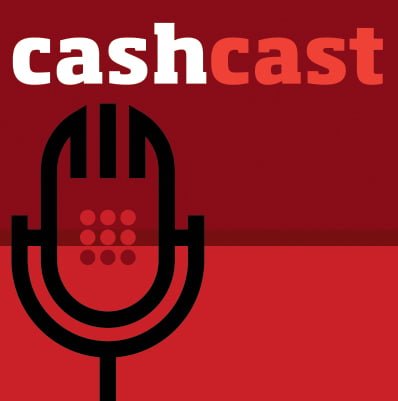
Podcast: Will risk aversion hold us back from realizing the potential of CVA?
Podcast
Episode 1 of the CashCast, exploring how attitudes to risk have impacted the use of CVA in the Middle East and North Africa region.

Transferts monétaires et risques : ce qui se passe sur le terrain, reste sur le terrain (et pourquoi c’est un problème)
Blog Post
En octobre 2019, le CALP Network a facilité à Douala, au Cameroun, une réunion de partage d’expériences sur les risques liés à la protection des bénéficiaires dans les interventions monétaires. Cette réunion restreinte, organisée dans le cadre d’une série de rencontres dans différentes régions, a permis à 25 travailleurs humanitaires d’Afrique de l’Ouest et du Centre,...

Webinar: Data sharing in CVA: ethics, ownership and privacy
Event
Thematic lead
Contenu récent

Notes d’orientation: les transferts monétaires dans les programmes de moyens d’existence – Afrique de l’Ouest
Guides et outils
Suite aux débats sur le rôle des transferts monétaires dans le renforcement de la résilience, l’acceptation croissante des transferts monétaires comme outil intersectoriel s’est accompagnée d’une meilleure compréhension de l’approche et de son potentiel à briser le cycle de pauvreté. Au...

The role of Cash Working Group Coordinator: Focus on Bangladesh
Blog Post
Multiple country cash working groups have emerged the past years to encourage the coordination of cash transfers across sectors. Eun Jung Yi, Coordinator of the Bangladesh Cash Working Group, presents some of the key achievements of the group within its first 12 months of existence.

Protection in Cash Based Interventions – Interviews with Richard Nunn and Lou Lasap
Blog Post
As part of an ECHO-funded Enhanced Response Capacity grant, UNHCR in partnership with WFP, Oxfam GB and the Cash Learning Partnership held an inter-agency workshop on cash and protection in Nairobi on the 10-12th March. The workshop brought together cash and protection practitioners to reflect upon...
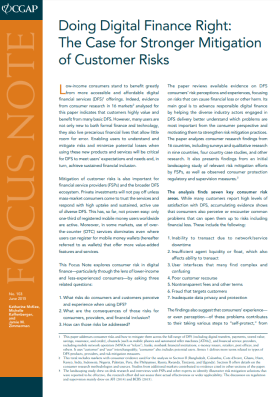
Doing Digital Finance Right: The case for stronger mitigation of customer risks
Policy paper
Low-income consumers stand to benefit greatly from more accessible and affordable digital financial services (DFS) offerings. Indeed, evidence from consumer research in 16 markets analyzed for this paper indicates that customers highly value and benefit from many basic DFS. However, many users are not...
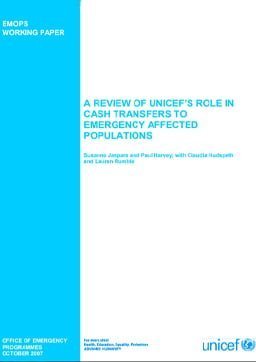
A Review of UNICEF’s Role in Cash Transfers to Emergency Affected Populations
Report
This paper is part of an ongoing process exploring UNICEF’s engagement with cash-based responses in emergencies. The main aim of the paper is to stimulate discussion on the potential role of cash transfers within UNICEF’s response to emergencies.
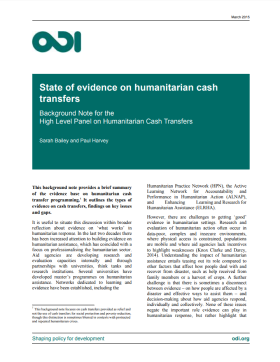
State of Evidence on Humanitarian Cash Transfers
Policy paper
The “State of evidence on humanitarian cash transfers” background note provides a brief summary of the evidence base on humanitarian cash transfer programming. The report also outlines the types of evidence on cash transfers, findings on key issues and gaps. This publication is an output of the...

Documentation and Learning: Rapid emergency assistance to Typhoon Ruby (Hagupit) affected communities in the province of Samar, Philippines April 2015
Report
The documentation and learning study identifies good practices and lessons from the implementation of the Rapid Emergency Assistance to Typhoon Ruby (Hagupit) Affected Communities in the Province of Samar by Christian Aid (CA) and its local NGO partners – Coastal Core Incorporated (CCI), Center for...
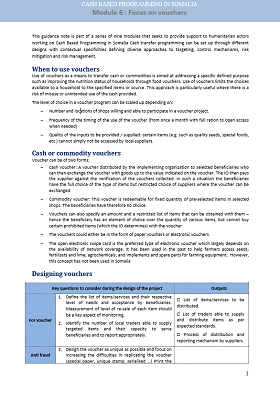
Cash Based Programming In Somalia – Module 6: Focus On Vouchers
Report
This guidance note is part of a series of nine modules that seeks to provide support to humanitarian actors working on Cash Based Programming in Somalia Cash transfer programming can be set up through different designs with contextual specificities defining diverse approaches to targeting, control...
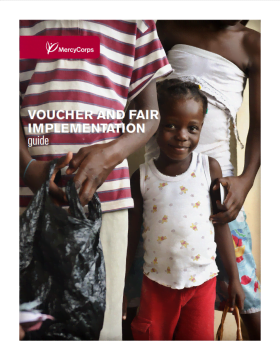
Voucher and Fair Implementation Guide
Guidelines and Tools
Mercy Corps’ Voucher and Fair implementation Guide provides clear, step-by-step guidelines for teams implementing cash, restricted cash, or commodity voucher programmes. Written for an internal audience, the Guide may also be useful for peer agencies.

Guide de mise en œuvre d’e-transfert
Guides et outils
Le Guide de mise en œuvre d’e-transfert a été créé pour les membres de l’équipe de Mercy Corps qui envisagent d’utiliser – ou qui utilisent déjà – les e-transferts pour apporter l’aide aux participants au programme. Les chapitres 1 et 2 donnent un aperçu des étapes nécessaires à...

Philippines Haiyan Response – A multi-sectoral review of the use of market analysis and the design and implementation of CTPs
Report
Following Typhoon Haiyan, which hit the Philippines on November 8 2014, at least 45 aid agencies chose to implement Cash Transfer Programming (CTP) to assist the more than 16 million people affected. Cash transfers were a logical approach in a country with developed market systems, strong financial...

Cash in Emergencies Toolkit
Guidelines and Tools
Access Toolkit Here Cash transfer based programming (CTP) is an effective and flexible way to support people affected by emergencies, maintaining their dignity and choice, while fostering local economies. CTP includes all forms of cash and voucher-based assistance. The Cash in Emergencies Toolkit has been...

Liberia Ebola Response
Presentation
ICRCs EVD Cash response program had to be designed under a rare circumstance of insufficient baseline data on EVD impact on household level and limited opportunity to contact intended beneficiaries for a detailed assessment/ proper situational analysis.

A Review of Evidence of Humanitarian Cash Transfer Programming in Urban Areas: Annexes
Report
Annexes to accompany the working paper ‘A review of evidence
of humanitarian cash transfer programming in urban areas”

Protection Risks and Benefits Analysis Tool
Report
This tool provides global evidence on the protection risks and benefits of cash-based interventions, divided into key protection areas. It outlines the key questions that practitioners should explore to reach a context-specific, participatory identification of protection risks and benefits of a given...

Orientations opérationnelles et boîte à outils pour les transferts monétaires à usages multiples
Guides et outils
Les présentes orientations opérationnelles et la boîte à outils qui l’accompagne réunissent une expertise mondiale sur les interventions monétaires. Elles apportent aux acteurs humanitaires des orientations complètes et pratiques afin d’évaluer la faisabilité des transferts monétaires,...

Privacy Impact Assessment of UNHCR Cash Based Interventions
Report
In 2014, the Office of the United Nations High Commissioner for Refugees (UNHCR) commissioned Trilateral Research & Consulting to conduct Privacy Impact Assessments (PIAs) of two of its Cash-Based Interventions (CBIs) in middle-income countries. The purpose of the PIAs was to help UNHCR assess the...
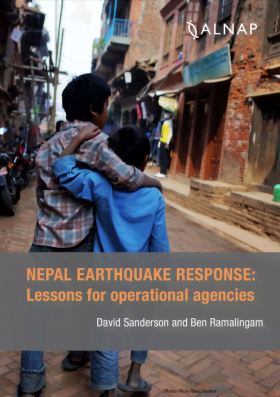
Nepal Earthquake Response: Lessons for operational agencies
Policy paper
In the aftermath of the April 2015 earthquake in Nepal, this paper looks at lessons drawn from previous comparable disasters and seeks to provide invaluable information and assistance to the operational agencies responding to the crisis. Seventeen Lessons give an overview of important learnings based on...

Integrating Cash Transfers into Gender-Based Violence Programs in Jordan: Benefits, risks and challenges
Report
With limited global practice and guidance on programming cash transfers to enhance protection in an emergency context, in 2013, the International Rescue Committee’s (IRC) started cash transfer programming (CTP) as part of the urban Women’s Protection and Empowerment (WPE) program in Jordan. Three...
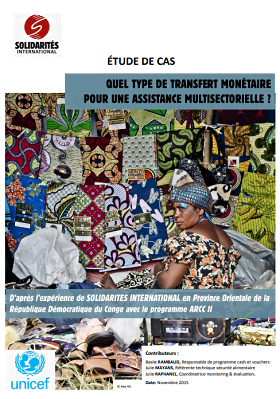
Quel type de transfert monétaire pour une assistance multisectorielle? Etude de cas: le programme ARCC II en RDC
Rapport
Cette étude de cas présente le projet ARCC II (Alternative Responses for Communities in Crisis) réalisé entre octobre 2013 et mars 2015 sur les territoires de Djugu, en Province Orientale, et de Béni, dans le Nord Kivu. Ce rapport se concentre sur la capitalisation opérationnelle de la mise en...



